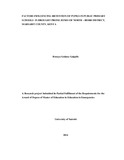| dc.description.abstract | The purpose of the study was to examine factors influencing retention of pupils in public
primary schools in drought prone zones of North – Horr District, Marsabit County. The
study was guided by four objectives. Objective one sought to determine how households
availability of food influence retention of public primary schools pupils in drought prone
zones, objective two sought to establish how sources of livelihood influence retention of
pupils in public primary schools in drought prone zone, objective three sought to assess
the extent to which involvement of pupils in household economic activities influence
their retention in public primary schools in drought prone zone while objective four
sought to assess how community conflict over pastures influence pupils’ retention in
public primary schools in drought prone zone of North-Horr District, Marsabit County.
The study employed descriptive survey design. The sample for the study comprised of
eight (8) headteachers, 44 teachers and 96 class 8 pupils. Data was collected by use of
using questionnaires, focus group discussions and interview. Presentation of data was
done using tables. Statistical Package for Social Sciences (SPSS) Software was used to
aid in the analysis of data. Findings on the effect of availability of food on pupils’
retention levels in public primary schools in drought emergency zones revealed that
availability of food has effect on pupils’ retention levels in public primary schools in
drought emergency zones as indicated by all the 7 headteachers and 43 of teachers. It was
also indicated that during hunger season, pupils lack enough energy to attend classes
especially when they walk long distance to school and it also affects their attention
towards the entire learning process. Findings on the effect of household’s loss of
livelihood on pupils’ retention levels in public primary schools in drought emergency
zones revealed that household’s loss of live hood has effect on pupils’ retention levels in
public primary schools in drought emergency zones as revealed by majority 5 out of 7
headteachers and majority 42 out of 44 teachers. Findings in the extent to which pupils’
involvement in household economic activities affects their retention levels in public
primary schools revealed that that pupils involvement in household economic activities
effect on pupils’ retention levels in public primary schools in drought emergency zones
as indicated by majority 7 out of 8 headteachers and majority 42 out of 44 teachers. It
was concluded that lack of food was a threat to participation in education. Lack of food
led to early marriage; pregnancies and prostitution. The study concluded that household’s
loss of live hood affected on pupils’ retention levels in public primary schools in drought
emergency zones. The study concluded that pupils’ involvement in household economic
activities effected on pupils’ retention levels in public primary schools in drought
emergency zones. It was concluded that conflict also affected pupils’ education because it
brought enmity between the pupils from different background. This research takes
exception to the fact that the study was conducted in Marsabit County yet retention of
pupils in public primary schools in drought prone zones is national wide; the researcher
suggested that the study be conducted in a larger area to compare the results. | en_US |

